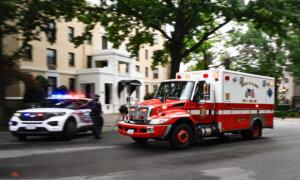The bill is opposed by Washington officials and the White House, who say it encroaches on the district’s autonomy.
The House of Representatives on May 15 passed a bill that would prohibit District of Columbia authorities from making changes to penalties for criminal offenses.
The D.C. Criminal Reforms to Immediately Make Everyone Safe (D.C. CRIMES) Act of 2024, passed 225–181
All Republicans and 18 Democrats voted in favor of it.
Congress has jurisdictional control over the District of Columbia, which is not a state, and therefore can block measures passed by the Council of the District of Columbia within 60 days of passage.
The District of Columbia government and the White House oppose the bill, with both saying that it infringes on the district’s autonomy.
The nation’s capital has home rule, which gives the district semi-independence.
In 1973, Congress passed legislation enabling this and allowing the election of a mayor.
Both the White House and the district say such a law would also prevent the District of Columbia Council from enacting stricter penalties for crimes.
Additionally, the bill would require the attorney general in the District of Columbia to “establish and operate a publicly accessible website that contains data on juvenile crime in the District of Columbia,” including how many young people are apprehended annually, a breakdown of youths arrested, and the number of vandalism, theft, and shoplifting crimes.
It also would mandate that the district publish juvenile arrest rates, and the numbers of first offenders and those arrested previously.
Eleanor Holmes Norton, the district’s delegate to the House, blasted the measure, calling it “radical, undemocratic, and paternalistic.”
As of May 15, there has been a 22 percent decrease in homicides, a 27 percent reduction in both robberies and burglaries, a 31 percent drop in motor vehicle theft, and a 21 percent reduction in thefts from autos.
However, there has been a 2 percent increase in non-auto thefts.
Last year saw a 26 percent spike in crime, including a 39 percent increase in violent crime, from the previous year.
There was a 35 percent jump in homicides, a 67 percent increase in robberies, an 82 percent rise in motor vehicle thefts, a 4 percent increase in burglaries, and a 23 percent hike in non-auto thefts.
In March, the District of Columbia Council passed the Secure DC Omnibus Amendment Act of 2024, a crime prevention bill that included establishing a new category of felony offense for “organized retail theft,” describing instances in which two or more individuals act to steal items with a combined value greater than $1,000 aggregated over 90 days, with the intent to sell or barter these items for gain or fraudulently return them to a retail merchant.
It also expanded the city’s legal definition of carjacking to include instances in which a victim is within the line of sight of their car or close enough that a perpetrator can snatch the victim’s keys and then “take immediate possession” of the car.
The crime bill also revives the city’s 90’s-era anti-loitering provisions and drug-free zones.
Other provisions in the bill raise penalties for firearm-related offenses.
The bill also redefines prohibited chokeholds from techniques that cause “a loss of consciousness” to those that cause “a protracted loss of consciousness.”
Last year, Congress blocked a measure by the city council that would have reduced mandatory minimums for some crimes, such as carjackings, in the nation’s capital.
It also would have allowed juries to decide misdemeanor cases.
Ryan Morgan contributed to this report.
Original News Source Link – Epoch Times
Running For Office? Conservative Campaign Consulting – Election Day Strategies!


